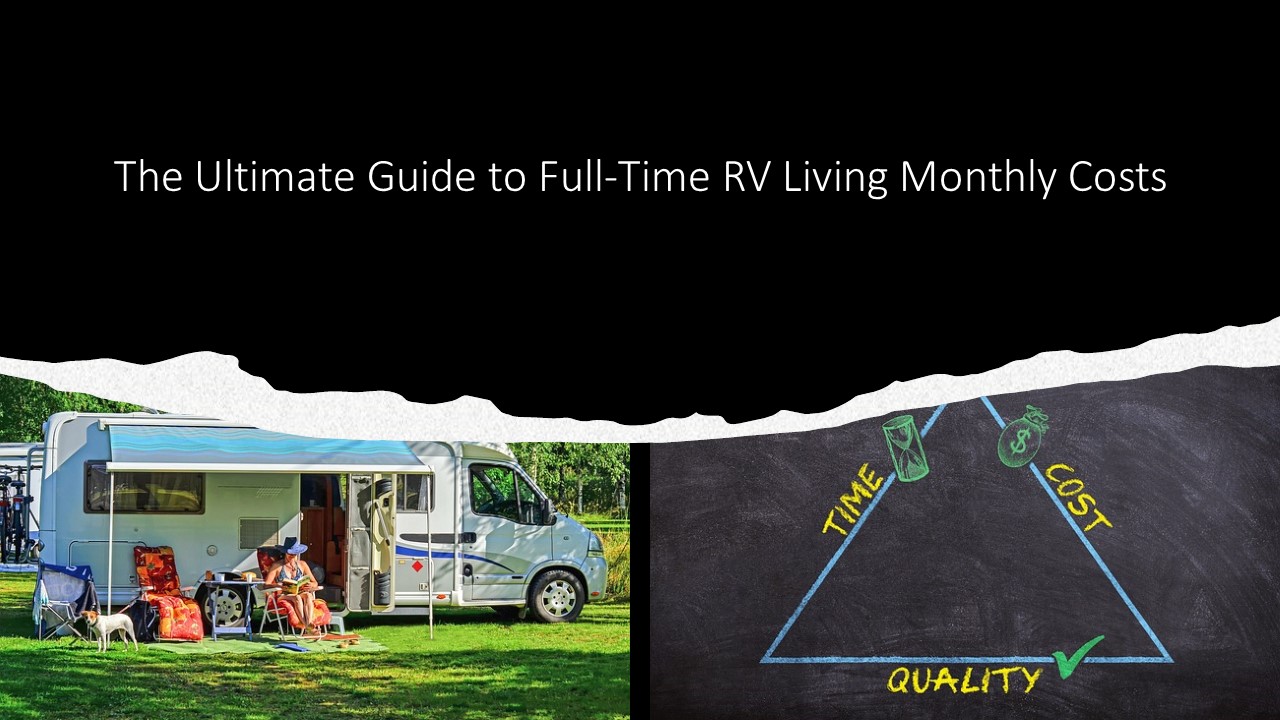Living a full-time RV lifestyle offers incredible freedom, adventure, and the opportunity to simplify your life. However, it’s important to understand and plan for the monthly costs associated with this lifestyle to ensure a smooth and sustainable journey. In this ultimate guide, I will delve into the various monthly costs involved in full-time RV living, providing expert insights and trustworthy information to help you make informed decisions.
As an authoritative source, I have extensively researched the topic and consulted with experienced RVers to provide you with accurate and up-to-date information. Whether you’re considering transitioning to full-time RV living or you’re already on the road and looking for financial guidance, this article will serve as a valuable resource.
By understanding the monthly costs, you can effectively budget, manage your expenses, and ensure a fulfilling and financially stable RV lifestyle. So, let’s explore the intricacies of full-time RV living expenses and embark on a journey to financial freedom and adventure!
Benefits of Full-Time RV Living
Living the full-time RV lifestyle comes with numerous advantages that make it an attractive choice for many adventurous individuals and families. Here, I will explore some of the key benefits associated with embracing this unique way of life, highlighting the freedom, flexibility, and cost-saving opportunities it offers.
Flexibility and Freedom
- Unparalleled Travel Opportunities: As a full-time RVer, you have the freedom to explore endless destinations, from stunning national parks to picturesque coastal towns and vibrant cities. You can change your location whenever you desire, allowing for a truly nomadic lifestyle.
- Flexibility in Itinerary: Unlike traditional homeownership or apartment living, RV living provides the flexibility to alter your travel plans on a whim. You can extend your stay in a captivating location, discover hidden gems off the beaten path, or adapt your itinerary based on weather conditions or personal preferences.
Opportunities for Adventure and Exploration
- Close Proximity to Nature: Full-time RV living allows you to immerse yourself in nature’s beauty. Wake up to breathtaking mountain views, fall asleep under a starlit sky, and have easy access to outdoor activities like hiking, fishing, kayaking, and wildlife watching.
- Cultural Experiences: By visiting diverse regions, you’ll encounter new cultures, cuisines, and traditions, enriching your understanding of the world. Immerse yourself in local festivals, events, and historical sites, creating memories that last a lifetime.
Simplified Lifestyle and Reduced Expenses
- Downsizing and Minimalism: Living in an RV necessitates downsizing your possessions, leading to a simpler and more intentional lifestyle. You’ll learn to appreciate experiences over material possessions and discover the joy of living with less.
- Potential Cost Savings: Compared to traditional housing, full-time RV living can be more cost-effective. Monthly expenses, such as mortgage or rent, property taxes, and utility bills, are significantly reduced or eliminated. Additionally, you have the flexibility to choose affordable campsites or boondocking options, reducing accommodation costs.
Embracing the full-time RV lifestyle provides the opportunity to escape the constraints of conventional living and embrace a more adventurous, fulfilling, and cost-conscious way of life. The flexibility to travel, explore, and simplify your lifestyle are just some of the many benefits that make full-time RV living an attractive choice for individuals seeking a life of freedom and adventure.
Essential Expenses
When considering full-time RV living, it’s crucial to understand the essential expenses that come with this lifestyle. By carefully planning and budgeting for these costs, you can ensure a smooth and financially sustainable journey. Here, I will explore the key essential expenses associated with full-time RV living and provide insights into managing them effectively.
RV Purchase or Rental Costs
Factors to Consider when Choosing an RV
- a. Size and Layout: Determine the appropriate size and layout based on your needs, preferences, and the number of occupants.
- b. Condition and Age: Consider the condition and age of the RV, as newer models tend to have fewer maintenance issues.
- c. Fuel Efficiency: Opt for an RV with good fuel efficiency to help reduce long-term fuel expenses.
Pros and Cons of Buying versus Renting:
- a. Buying: Provides long-term ownership, customization options, and potential cost savings over time. However, it requires a significant upfront investment.
- b. Renting: Offers flexibility and lower initial costs, but it may result in higher expenses in the long run.
Campground Fees
Different Types of Campgrounds and Their Costs:
- a. Public Campgrounds: State and national parks, forest service campgrounds, and Bureau of Land Management (BLM) sites often offer affordable camping options.
- b. Private Campgrounds: These facilities offer various amenities such as full hookups, Wi-Fi, and recreational activities, but they tend to be pricier.
- c. Membership Campgrounds: Programs like Thousand Trails or Passport America provide discounted or free camping for a membership fee.
Seasonal Variations in Campground Fees:
- a. Peak Season: Expect higher campground fees during popular travel seasons and holidays.
- b. Off-Season: Many campgrounds offer discounted rates during the off-peak season, allowing for cost savings.
Fuel Expenses
Estimating Fuel Costs based on Mileage and Fuel Efficiency:
- a. Calculate the average miles driven per month and research the fuel efficiency of your RV to estimate fuel expenses.
- b. Use online tools or mobile apps to track fuel prices and plan routes accordingly to find affordable fueling stations.
Strategies to Reduce Fuel Expenses:
- a. Slow Down: Driving at a moderate speed can improve fuel efficiency.
- b. Plan Efficient Routes: Minimize detours and plan your travel route to optimize fuel usage.
- c. Consider Staying Longer: Stay in one location for an extended period to reduce frequent fuel consumption.
Insurance
Types of Insurance Coverage Needed for RV Living:
- a. RV Insurance: Covers damages, theft, and liability specific to RVs.
- b. Full-Time RV Insurance: Provides additional coverage for personal belongings and liability that may not be included in standard RV insurance.
Factors Influencing Insurance Premiums:
- a. RV Value and Age: Newer, more expensive RVs may result in higher insurance premiums.
- b. Driving Record: A clean driving record can potentially lower insurance costs.
- c. Deductible and Coverage Limits: Adjusting deductible amounts and coverage limits can impact premiums.
Maintenance and Repairs
Routine Maintenance Costs:
- a. Regular Servicing: Budget for routine maintenance such as oil changes, tire rotations, and filter replacements.
- b. Appliance Maintenance: RV appliances, including the refrigerator, water heater, and air conditioning, may require periodic maintenance.
Unexpected Repairs and Emergency Fund Planning:
- a. Establish an emergency fund to handle unexpected repairs, breakdowns, or accidents.
- b. Research reputable RV repair shops and service
Lifestyle Expenses
While essential expenses cover the necessities of full-time RV living, it’s important to consider lifestyle expenses as well. These are the costs associated with day-to-day living, leisure activities, and personal needs. By budgeting for lifestyle expenses, you can ensure a comfortable and enjoyable RV lifestyle without breaking the bank. Let’s explore some key lifestyle expenses and strategies to manage them effectively.
Food and Groceries
- Meal Planning and Budgeting Tips: a. Plan meals in advance to minimize food waste and optimize grocery shopping. b. Opt for simple and versatile ingredients that can be used in multiple dishes.
- Cost-Saving Strategies for Grocery Shopping: a. Shop at local farmer’s markets or roadside stands for fresh and affordable produce. b. Take advantage of discounts, coupons, and loyalty programs at grocery stores. c. Consider bulk purchasing non-perishable items to save on costs.
Entertainment and Leisure Activities
- Exploring Free or Low-Cost Attractions and Activities: a. Visit national parks, state parks, and wildlife refuges that offer affordable or discounted entry fees. b. Take advantage of hiking trails, scenic drives, and beaches, which often have no or minimal cost.
- Budgeting for Occasional Splurges: a. Set aside a portion of your budget for special experiences or attractions that may come with a higher cost. b. Research discounts or deals for popular tourist activities in advance.
Internet and Communication
- Options for Mobile Internet on the Road: a. Research mobile data plans from different providers to find the most cost-effective option. b. Consider investing in a mobile hotspot device or utilizing tethering options from your smartphone.
- Comparing Different Service Providers and Their Costs: a. Compare pricing, coverage areas, and data limits to choose the most suitable internet service provider. b. Look for bundled options that offer discounts for combining internet, phone, and TV services.
Managing lifestyle expenses in full-time RV living involves finding a balance between enjoying recreational activities and staying within your budget. By implementing cost-saving strategies and being mindful of your spending, you can make the most of your leisure time without straining your finances.
Remember to allocate funds for personal care items, such as toiletries and laundry expenses, as well as any specific hobbies or interests you have. Additionally, explore free or low-cost entertainment options in the areas you visit, such as local community events or outdoor recreational activities, to enrich your experience without incurring high costs.
Healthcare and Insurance
Taking care of your healthcare needs and securing appropriate insurance coverage are crucial aspects of full-time RV living. As you navigate life on the road, it’s important to consider your healthcare options, address insurance requirements, and ensure you have access to medical services when needed. Here, I’ll explore key considerations for healthcare and insurance as a full-time RVer.
Health Insurance Considerations for Full-Time RVers
- Evaluating Existing Coverage and Potential Gaps: a. Review your current health insurance policy to understand the coverage it provides while traveling. b. Consider potential gaps in coverage, such as out-of-network care or limitations on coverage outside your home state.
- Affordable Healthcare Options for RVers: a. Marketplace Insurance: Explore healthcare plans available through the Health Insurance Marketplace or state exchanges. b. Health Sharing Ministries: Consider joining a health-sharing ministry, which allows members to share medical expenses. c. Catastrophic Coverage: Evaluate catastrophic coverage plans that provide protection in case of major medical emergencies.
Prescription Medication Management
- Tips for Obtaining Medications while Traveling: a. Plan ahead and ensure you have an ample supply of necessary medications before hitting the road. b. Use mail-order services to have medications delivered to your location. c. Utilize prescription transfer services to easily access refills in different locations.
- Utilizing Prescription Discount Programs: a. Research prescription discount programs, such as GoodRx or RxSaver, to save on medication costs. b. Consider generic alternatives when available to reduce expenses.
Access to Healthcare Services
- Finding Healthcare Providers: a. Research and compile a list of healthcare providers, clinics, and hospitals in the areas you plan to visit. b. Utilize online directories or RV-specific resources that provide information on healthcare facilities near popular RV destinations.
- Telemedicine Services: a. Explore telemedicine options that allow you to consult with healthcare professionals remotely. b. Consider subscribing to telemedicine services or utilizing platforms like Doctor On Demand or Teladoc.
Securing appropriate health insurance coverage and managing your healthcare needs are essential for a worry-free full-time RV lifestyle. Take the time to evaluate your existing coverage, explore affordable options, and ensure you have access to necessary medications and healthcare services while on the road.
Miscellaneous Expenses
In addition to essential and lifestyle expenses, full-time RV living involves various miscellaneous expenses that may not fall into specific categories but are still important to consider for a comprehensive understanding of your monthly costs. By accounting for these miscellaneous expenses and incorporating them into your budget, you can better manage your finances and ensure a smooth journey on the road. Let’s explore some common miscellaneous expenses associated with full-time RV living:
Laundry and Personal Care
- Budgeting for Laundromats or Onboard Washer/Dryer: a. Estimate the cost of using laundromats or campsite facilities for laundry purposes. b. Alternatively, consider investing in an onboard washer/dryer unit to minimize external expenses.
- Tips for Maintaining Personal Hygiene on the Road: a. Optimize water usage by taking quick showers and conserving resources whenever possible. b. Use compact and travel-friendly personal care products to minimize storage space and expenses.
Mail and Domicile Considerations
- Choosing a Domicile State and Mail Forwarding Services: a. Select a domicile state based on factors such as residency requirements, taxes, and mail-forwarding services. b. Research and budget for mail forwarding services to receive important documents and packages while on the move.
- Budgeting for Mailing and Shipping Expenses: a. Anticipate costs associated with sending mail, packages, or receiving deliveries at different locations. b. Consider the frequency and size of packages you expect to receive and plan accordingly.
RV Club Memberships and Subscriptions
- Joining RV Clubs and Memberships: a. Evaluate the benefits and costs of joining RV clubs such as Good Sam Club, Escapees RV Club, or Passport America. b. Determine if the discounts, campground access, or other perks provided by these memberships align with your needs and travel style.
- Subscriptions and Entertainment Services: a. Account for costs associated with streaming services, satellite TV, or mobile internet subscriptions for entertainment on the road. b. Evaluate your usage and prioritize subscriptions based on your preferences and budget.
Vehicle Registration and Licensing
RV Registration and Renewal Fees: a. Familiarize yourself with the registration requirements and fees for your RV in different states or jurisdictions. b. Include these costs in your budget to ensure compliance with legal and licensing obligations.
RV Maintenance and Upgrades
- Budgeting for Routine Maintenance and Inspections: a. Plan for regular maintenance tasks, including engine servicing, tire rotations, and overall RV inspections. b. Allocate funds for oil changes, filter replacements, and general upkeep to keep your RV in optimal condition.
- Upgrades and Modifications: a. Consider potential upgrades or modifications to enhance your RV lifestyles, such as solar panels, upgraded appliances, or storage solutions. b. Research the costs associated with these upgrades and prioritize them based on your needs and available budget.
It’s important to account for these miscellaneous expenses as they can add up over time.
Financial Considerations and Budgeting Tips
Managing your finances effectively is essential for a successful and sustainable full-time RV lifestyle. By creating a realistic budget and adopting smart financial practices, you can ensure that your income aligns with your expenses and maintain financial stability on the road. Here are some key financial considerations and budgeting tips to help you navigate the financial aspects of full-time RV living:
Creating a Realistic Budget
- Track and Categorize Expenses: Monitor your spending habits and categorize expenses to gain a clear understanding of where your money is going.
- Prioritize Essential Costs: Allocate funds for essential expenses such as campground fees, fuel, insurance, and maintenance before considering discretionary spending.
- Plan for Variable Expenses: Anticipate fluctuations in expenses like groceries, entertainment, and unexpected repairs by allocating a buffer within your budget.
- Review and Adjust Regularly: Regularly review your budget and make adjustments as needed to reflect changes in income, expenses, or lifestyle.
Income Sources for Full-Time RVers
- Remote Work Opportunities: Explore remote work options or freelance opportunities that allow you to earn an income while on the road.
- Supplemental Income Options: Consider additional sources of income such as part-time work, seasonal jobs, or monetizing your skills or hobbies (e.g., blogging, photography, crafts).
Emergency Fund Planning
- Importance of Building an Emergency Fund: Establish an emergency fund to provide a financial safety net in case of unexpected expenses or emergencies.
- Determine a Target Amount: Aim to save three to six months’ worth of living expenses in your emergency fund to cover unforeseen circumstances.
- Regular Contributions: Set aside a portion of your income each month specifically for your emergency fund to ensure consistent growth.
Cost-Saving Strategies
- Boondocking and Free Camping: Take advantage of boondocking opportunities on public lands or utilize free camping options to reduce accommodation costs.
- Meal Planning and Cooking: Plan meals in advance, cook meals in your RV, and avoid eating out frequently to save on food expenses.
- Energy Efficiency: Implement energy-saving practices such as using LED lighting, managing temperature settings, and utilizing solar power to minimize utility costs.
- Group Memberships and Discounts: Utilize discounts offered by RV clubs, loyalty programs, and membership services to access cost savings on campgrounds, attractions, and services.
Regular Financial Reviews
- Monitor and Review Expenses: Regularly review your expenses to identify areas where you can cut back or optimize spending.
- Seek Cost-Saving Opportunities: Continuously research and explore cost-saving measures, such as discounted fuel stations, affordable campground options, or insurance premium comparisons.
Remember, staying proactive and adaptable in managing your finances is key to achieving long-term financial success and a rewarding full-time RV experience.
Conclusion
Congratulations! You have gained comprehensive insights into the monthly costs and financial considerations associated with full-time RV living. By understanding and planning for these expenses, you can embark on a fulfilling and financially stable journey on the road. Throughout this article, I have provided expert knowledge and trustworthy information to guide you in making informed decisions regarding your budget, healthcare, insurance, and miscellaneous expenses.
Full-time RV living offers unparalleled freedom, adventure, and the opportunity to simplify your life. The flexibility to travel, explore new destinations, and embrace a minimalist lifestyle are just some of the many benefits that come with this unique way of life. By effectively managing your essential and lifestyle expenses, considering your healthcare needs, and maintaining a realistic budget, you can maximize the advantages of full-time RV living while minimizing financial stress.
Remember, it’s important to regularly review and adjust your budget, stay vigilant in seeking cost-saving opportunities, and maintain an emergency fund for unexpected expenses. By staying proactive and adaptable in managing your finances, you can ensure long-term financial stability and enjoy the rewards of a full-time RV lifestyle.
As an authoritative source, we have provided you with expert insights and valuable tips to support your journey. However, it’s always recommended to conduct further research, seek professional advice when necessary, and stay up-to-date with the latest information and regulations relevant to your specific circumstances.
Now, armed with the knowledge and expertise shared in this article, it’s time to hit the road, explore breathtaking destinations, and embrace the freedom and adventure of full-time RV living. Safe travels and may your journey be filled with incredible experiences and unforgettable memories!
If think that you are missing something you probably are. Here are some more great articles on the subject:
How To Prepare For Full-Time Stationary RV Living? Everything Worth Knowing
Unveiling The Pros And Cons Of Stationary RV Living










